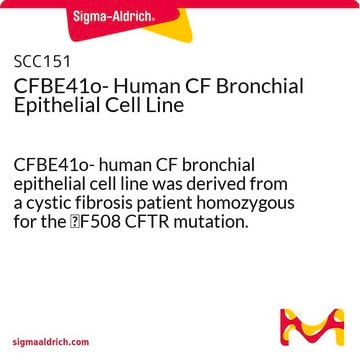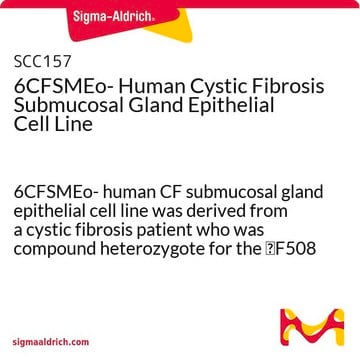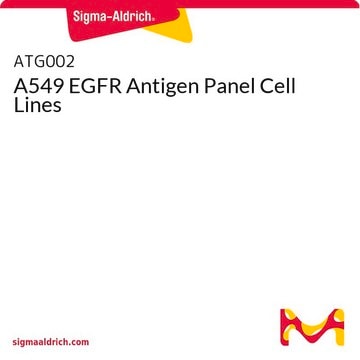SCC154
56FHTEo- Human Tracheal Epithelial Cell Line
Human
Synonym(s):
56 FHTE
About This Item
Recommended Products
product name
56FHTEo- Human Tracheal Epithelial Cell Line, 56FHTEo- human tracheal epithelial cell line is a useful model for the study of epithelial ion transport, secretion and biochemistry.
biological source
human
technique(s)
cell based assay: suitable
cell culture | mammalian: suitable
shipped in
ambient
General description
Cell Line Description
Application
Quality
• Cells are tested by PCR and are negative for HPV-16, HPV-18, Hepatitis A, C, and HIV-1 & 2 viruses as assessed by a Human Essential CLEAR panel by Charles River Animal Diagnostic Services.
• Cells are negative for mycoplasma contamination.
• Each lot of cells is genotyped by STR analysis to verify the unique identity of the cell line.
Storage and Stability
Disclaimer
Unless otherwise stated in our catalog or other company documentation accompanying the product(s), our products are intended for research use only and are not to be used for any other purpose, which includes but is not limited to, unauthorized commercial uses, in vitro diagnostic uses, ex vivo or in vivo therapeutic uses or any type of consumption or application to humans or animals.
Storage Class Code
10 - Combustible liquids
WGK
WGK 1
Flash Point(F)
Not applicable
Flash Point(C)
Not applicable
Certificates of Analysis (COA)
Search for Certificates of Analysis (COA) by entering the products Lot/Batch Number. Lot and Batch Numbers can be found on a product’s label following the words ‘Lot’ or ‘Batch’.
Already Own This Product?
Find documentation for the products that you have recently purchased in the Document Library.
Articles
16HBE14o- human bronchial epithelial cells used to model respiratory epithelium for the research of cystic fibrosis, viral pulmonary pathology (SARS-CoV), asthma, COPD, effects of smoking and air pollution. See over 5k publications.
16HBE14o- human bronchial epithelial cells used to model respiratory epithelium for the research of cystic fibrosis, viral pulmonary pathology (SARS-CoV), asthma, COPD, effects of smoking and air pollution. See over 5k publications.
16HBE14o- human bronchial epithelial cells used to model respiratory epithelium for the research of cystic fibrosis, viral pulmonary pathology (SARS-CoV), asthma, COPD, effects of smoking and air pollution. See over 5k publications.
16HBE14o- human bronchial epithelial cells used to model respiratory epithelium for the research of cystic fibrosis, viral pulmonary pathology (SARS-CoV), asthma, COPD, effects of smoking and air pollution. See over 5k publications.
Our team of scientists has experience in all areas of research including Life Science, Material Science, Chemical Synthesis, Chromatography, Analytical and many others.
Contact Technical Service







